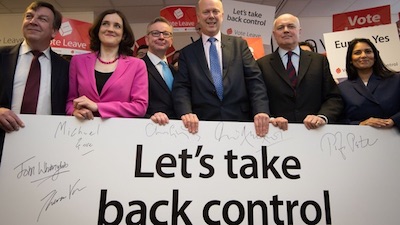
British prime minister David Cameron has named June 23 for a referendum on leaving the European Union after negotiating what he said were special reforms of the EU to protect British interests.
In the latest ‘poll of polls’, 52 per cent of voterss across Britain favour remaining in the EU, with 48 per cent want to leave.
Cameron warned that leaving Europe would be a “leap in the dark”. But British Direct Ruler in the north of Ireland, Theresa Villiers, has joined the DUP in backing a ‘Brexit’, despite nationalist concerns that this would further divide the island of Ireland.
Six British government ministers have joined the campaign to leave the EU, and Villiers (pictured, second left) is one of the most outspoken. Speaking on her way back to Belfast, she said she will vote to leave the EU “to take back control over our country and making our laws and controlling our borders”.
She said there had been a sense of history at the cabinet meeting to discuss the vote - the first to be called on a Saturday since the Falklands War.
“In the decades ahead we face a European project that is ever more determined to integrate, to take more powers and we could be outvoted many times over the years to come,” she said. “So there is no stable status quo for us to cling to.”
However, her stance has been met with criticism on both sides of the Irish border. SDLP leader Colum Eastwood last night called for Villiers to resign should the north of Ireland vote to stay in the European Union.
“The secretary of state has chosen to join the extremists and the eccentrics in advocating a vote to leave the European Union. In doing so, Theresa Villiers is not representing the interests of the north but those of her own internal Tory agenda,” he said.
“In placing herself at the frontline of the Leave campaign, the secretary of state has now firmly attached her fate to the result of this referendum.
“By nailing her colours to the mast with such publicity, Theresa Villiers will have little choice but to resign her position should the north vote to remain within the EU.”
Sinn Fein’s Martin McGuinness described Ms Villiers as being “cut off from public opinion”.
“It’s odd that Theresa Villiers should now be advocating withdrawing from the EU when its benefits for the North are quite obvious,” he said.
“It’s not surprising however given the fact that she is not elected by and does not represent the people of the north that she should be so cut off from public opinion.
“All sections of our society have benefited from our EU membership and in the coming weeks and months Sinn Fein will campaign to stay in.”
Politicians have expressed fears that Britain leaving the EU could throw the North’s political institutions into turmoil, and the prospect of a return of identity and/or customs checks at the border is a major issue. EU funding has also sustained many community projects within the Six Counties and the entire Border Region, and is a key support for the agricultural industry.
But Villiers has rubbished these concerns and dismissed calls for her to step down.
“We’ve run an effective common travel area for many decades with the Republic of Ireland and there’s every reason to suggest that that would continue whether we leave the EU or we don’t,” she said.
In the early days of the EU, Ian Paisley complained of a European plot involving the ‘Antichrist’ (the Pope). However, the Euro elections did more for the rise of the DUP than almost anything else. The current DUP leader Arlene Foster said her party remains opposed to Europe and would recommend a vote to leave the EU in the historic referendum. But she added they “fully expect that DUP members and voters will hold a range of differing personal views” and they are “fully entitled to do so”.
In London, Mayor and leading Tory Boris Johnson has said he will campaign for Britain to leave the EU in a significant challenge to David Cameron’s authority. He said Cameron’s latest negotiations had failed to deliver fundamental change in Britain’s relationship with Brussels.
US secretary of state John Kerry called for Britain to remain in the EU, but drew an angry response from Tory extremists. Tory MP Jacob Rees-Mogg blasted the veteran US politician as a “terrorist sympathiser” because he had blocked the deportation of Irish republicans after he “held up” an extradition treaty. “He is no friend of Britain,” he said.
![[Irish Republican News]](https://republican-news.org/graphics/title_gifs/rn.gif)
![[Irish Republican News]](https://republican-news.org/graphics/title_gifs/harp.gif)

